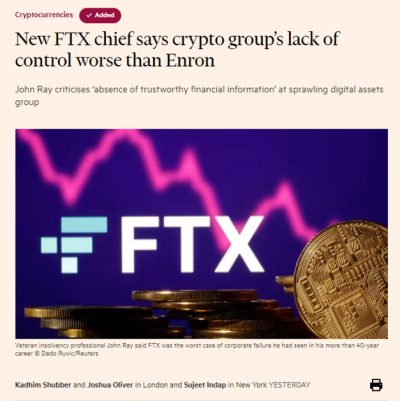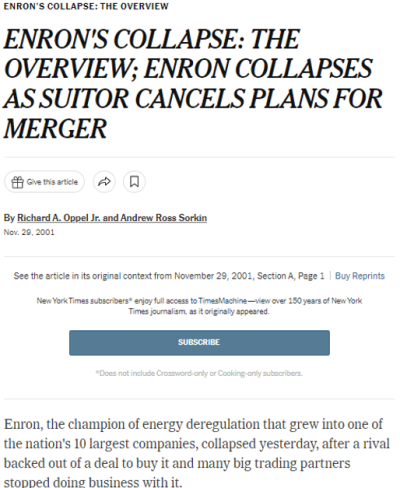If you would like to receive weekly updates like this, sign up here.
Is there anything worse than the collapse of a large organization, upon which millions of people depended, thanks to financial irregularities, fraud, inept management, and a culture of deliberately withholding the truth from shareholders and policy makers alike?
I’d hazard a guess that not much comes to mind.
I am of course referring to the collapse of FTX, the subject of many a lurid headline in recent days. It is a big deal for financial markets and the crypto space in general. It’s quite possible you were affected too.
Or know someone who is.
It’s going to bring in big changes.
But what if I told you this was all just so predictable from a timing perspective.
Because this time around during the last 18.6-year cycle we had something similar took place.
It resulted in all the same emotion, utter disbelief; and it was caused by the same level of deceit and abject management. I am referring to the Enron scandal back in 2001.
Read on now as I explain what the recent collapse of FTX and its closest comparison Enron back in the early 2000’s can tell us about the excesses of these times.
But also, the “huge” clue that’s been completely missed by those reporting on this.
And why you really need to be doing the precise opposite to what you’re being told now.
If it bleeds, then it leads.
The above nicely states how modern media love to report news.
If they sense blood on the streets, metaphorically speaking of course, then bet your bottom dollar that the same news will always be front and centre in the news cycle.
Here again is a prime example of what I’m describing to you, a recent headline in the Financial Times:

Source: FT
I rarely find a headline that combines the two major points I’d like to make to you in these blogs, but this is one of them.
FTX is of course the now infamous cryptocurrency exchange based in (of course) the Bahamas since 2019.
At its peak in 2021, FTX had over one million users and was the third largest crypto exchange by volume. But since 11 November 2022, FTX has been in bankruptcy proceedings in the US court system following what some called a “liquidity” crisis.
Liquidity crisis doesn’t cover what really went on.
John Ray III, who was appointed to run the FTX bankruptcy, said in a US court filing that he had never seen “such a complete failure of corporate controls and such a complete absence of trustworthy financial information”.
John Ray should know, after all. He was the insolvency expert who oversaw the liquidation of Enron back in 2001.
I accept some reading today may not be aware of Enron. Here is an example of the headline in the New York Times at the time.

Source: NY Times
This was at the time the biggest corporate bankruptcy in US history. It also was a BIG deal!
Enron was an energy-trading and utility company based in Houston, Texas, that perpetrated one of the biggest accounting frauds in history. Enron’s executives employed accounting practices that falsely inflated the company’s revenues and, for a time, making it the seventh-largest corporation in the United States.
Its true undoing was massive trading using borrowed money in energy derivatives, creating huge losses that went unreported via fraudulent accounting methods.
It was so bad that it brought down one of the world’s largest accountancy firms, Arthur Andersen.
More about the timing of this disaster in a moment.
We turn now to some of the explosive revelations about FTX being reported from the filings being lodged at the bankruptcy court in Delaware.
The filings underlined the chaos and mismanagement at the heart of Sam Bankman-Fried’s collapsed $32bn crypto exchange, which has plunged digital asset markets into crisis.

Source: FT
And don’t think this is simply retail mum and dad investors chasing quick riches that were lured in. FTX raised billions of dollars from top-tier venture capital investors such as Sequoia, SoftBank and Temasek.
Per John Rays findings, FTX US and Bankman-Fried’s Alameda Research trading company used “compromised systems integrity,” “faulty regulatory oversight abroad” and a “concentration of control in the hands of a very small group of inexperienced, unsophisticated and potentially compromised individuals.”
This lack of transparency and accountability led to a whole slew of ridiculous over-the-top behavior and almost criminal disregard for proper business processes and client confidentiality.
FTX failed to keep proper books, records, or security controls for the digital assets it held for customers, used software to “conceal the misuse of customer funds,” said Ray.
He added that FTX did not have an accounting department and instead outsourced “this function”. The company did not have “an accurate list” of its own bank accounts, or even a complete record of the people who worked for it.
FTX used “an unsecured group email account” to manage the security keys for its digital assets, he added. The group’s funds had been used “to purchase homes and other personal items” for staff and advisers, and payments were approved using “personalised emojis” in an online chat, according to Ray.
This would make for some serious comedy if it wasn’t for the fact this was all done using clients’ money. Maybe even yours?
Is this what you signed up for? Would you be happy for your hard-won capital being used to buy homes and cars for employees of FTX rather than being used to provide you with a return on the risk taken?
Oh, about that capital. Recall I mentioned that FTX was once a $32 billion-dollar crypto exchange?
As of September 30th, this year, the fair value of the crypto based assets held by FTX were priced at approx. $660K.
Who is owed what precisely has yet to be determined. Certainly, a hack that saw $400 million worth of cryptos stolen just prior to FTX listing for bankruptcy wouldn’t have helped.
The truth is, no-one really knows, due to a complete lack of reliable information held by the company.
And yet, what precisely did people expect from an unregulated crypto exchange operating like it’s the wild west? You could say those involved got exactly what they deserved.
But this isn’t the main takeaway for you.
What if I told you, much like Enron, the collapse of FTX is a huge signal it’s time to go all in!
You won’t ever catch this train again when it leaves without you.
I did mention Enron’s timing was of interest above.
Here’s why. It was the poster child of all the very worst excesses and mismanagement at that particular time. So, what ‘time’ was it?
2001 was the end of the then mid cycle recession of the previous full 18.6-year Real Estate Cycle (1992 to 2010).
This is a time where the rug is pulled from under the most over-leveraged and highly indebted companies. Usually, the peak is marked with the biggest, most expensive and over the top bankruptcy up to that time.
That was Enron’s crown back then. It was the largest in a series of corporate scandals that were revealed during and just after the mid-cycle recession.
The Enron scandal took months to play out and it was not until late 2002 and 2003 that all this news had been absorbed by the market.
My contention is this is playing the same role today. We have seen several corporate scandals during the mid-cycle recession, including Wirecard and WeWork, Citadel, and now FTX. And the reason is, just like in 2001, the current real estate cycle we are in has now left its own mid cycle recession behind it.
And I know this because events like these corporate scandals punctuate the end of the mid-cycle and the start of the second, more speculative, half of the cycle which is now underway.
Let me be more frank with you: it’s a signal to buy!
Are you hearing that message from the media today?
Of course not. There is blood in the street, many millions of mum and dad investors to scare with all the horrors of the latest failed crypto exchange.
Even more important than that, it shows you once again the innate advantage one can have once you have the knowledge the timing of the 18.6-year Real Estate Cycle can provide.
For mine, I had zero idea who would be the next Enron and I didn’t much care. I simply knew that someone would be it.
Like all the previous real estate cycles in US history before this one, it’s the heralding of the biggest bankruptcy which mark the true beginning of the next chapter.
You’ll know it too: same behavior, same levels of utter ineptitude and brazen disregard for corporate laws, fraud, embezzlement. Simply swap Enron with FTX. No difference.
I simply waited for it to happen, fully confident that it would. And it has.
Now that confidence turns to preparedness and the lessons of history. And of what that same history tells me the real estate cycle will do next.
Here’s where you find that information: with a membership to the Boom Bust Bulletin.
It will teach you the history of the 18.6-year Real Estate Cycle, why it continues to repeat to this very day (Enron & FTX!) and guide you on the unique opportunities the timing of the cycle presents as it turns.
This is not the time to be fearful. Yes, learn the lessons from the FTX’s and Enron’s of this world but don’t be scared into inaction. And you can bet that many years from now we will once again be faced with similar excesses then busts.
For today though we are presented with a short window to get our capital in order, complete our research and start to reenter the markets, positioned to hopefully profit as the cycle stands ready to reach its peak later this decade.
Ignore the noise around you.
If you hold out hope that you can partake in the greatest wealth accumulation period of your life thus far, then what unlocks that hope for you is knowledge.
The hard work has just begun. The ride will be emotional and at times draining on you. You must accept this.
It is the price paid for financial freedom, and FTX has just fired the starters gun.
Do not miss this train. It will not wait for you.
Best wishes,

Darren J Wilson
and your Property Sharemarket Economics Team
P.S. – If you would like to receive weekly updates like this, sign up here.
P.P.S – Find us on Twitter here and go to our Facebook page here.
This content is not personal or general advice. If you are in doubt as to how to apply or even should be applying the content in this document to your own personal situation, we recommend you seek professional financial advice. Feel free to forward this email to any other person whom you think should read it.



